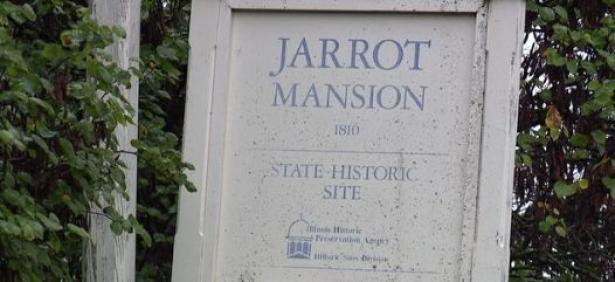CAHOKIA HEIGHTS, Ill. — The Jarrot Mansion was built in 1810 and still stands in Cahokia Heights, Illinois. It’s now recognized as the oldest brick building in the state of Illinois and a state historic site.
In the 1840s, a man named Pete lived on the mansion grounds as one of the many slaves or "indentured servants," considered property of the Jarrot family. He eventually sued for his freedom and began to change Illinois' history.
"He was the vanguard of this case that basically outlaws slavery in totality for the entire state of Illinois," said Brad Winn, the site manager at Jarrot Mansion and a local historian.
We know it now as the "Land of Lincoln," but Illinois’ stance on slavery hasn't always been so firmly planted against it.
"A servant for life? How is that any different than an enslaved individual?" Winn said.
It's the same question Joseph 'Pete' Jarrot asked himself after decades of living in servitude. In 1843, he brought that question to the St. Claire County Court.
Winn said, Pete was "suing not only for his freedom, but for back wages owed to him as a worker in the Jarrot family."
In court, Pete's "master," Julia Jarrot, argued he was a slave. She claimed he was descended from a woman who was also a slave in Illinois before the passage of the Northwest Ordinance, and therefore, he wasn't entitled to any wages.
"In 1787, the United States-- this is the Articles of Confederation, by the way-- passed a law called the Northwest Ordinance, which basically outlaws slavery north of the Ohio River," Winn said. "Illinois is north of the Ohio River. So, slavery should not exist anywhere in Illinois."
To keep slavery legal, the law of the land was tweaked in 1818, cementing the changes in the 1818 Illinois State Constitution, Illinois’ first constitution as a state in the Union.
Illinois entered the Union that year as a "free" state on paper, but we know people were still being held in bondage.
Essentially, Illinois was operating in a loophole, Winn said.
"Slavery was allowed to continue with legal backing because … laws were created to sidestep the word 'slave' and call them indentured servants," he said.
Those laws, cemented in the 1818 constitution, said it was legal to hold a person as an indentured servant. Some servants would be held to work servitude terms that would last a lifetime.
The 1818 Illinois State Constitution reads, "Neither slavery nor involuntary servitude shall hereafter be introduced into this state."
The word "hereafter" essentially "grandfathered in" slavery, meaning slaves who already lived in the state before the issuance of the constitution would not be freed.
Pete argued this was wrong.
"His case was originally heard in Belleville," Winn said. "The court ruled in favor of Pete's 'master,' Julia."
But Pete appealed, and in 1845, his case was taken before the Illinois Supreme Court.
"The court ruled in accordance with the Northwest Ordinance of 1787, slavery cannot exist in any form," Winn said.
In 1848, the Illinois State Constitution was changed to reflect the ruling, declaring "There shall be neither slavery nor involuntary servitude in the state..."
Pete's impact was permanently etched into history. His case became one of the many to hold America accountable to its declaration that "all men are created equal."
"I think it's incredible to imagine what it would have been like to take those first steps, to try to cross the river, to sue to win your freedom," Winn said. "Thank goodness that they did."
The influence of Pete's case stretched far beyond Illinois. His lawyer, Lyman Trumbull, ended up being one of the crafters of the 13th Amendment to the U.S. Constitution, which abolished slavery nationwide.
KSDK.com: To watch 5 On Your Side broadcasts or reports 24/7, 5 On Your Side is always streaming on 5+. Download for free on Roku, Amazon Fire TV or the Apple TV App Store.


Spread the word